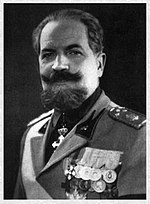Attilio Teruzzi, Date of Birth, Place of Birth, Date of Death
TweetAttilio Teruzzi
Italian colonial administratorAbout Attilio Teruzzi
- Attilio Teruzzi (5 May 1882 – 26 April 1950) was an Italian soldier, colonial administrator, and Fascist politician. Born in Milan, Teruzzi completed military studies and was promoted colonel in the Italian Army at the unusual age of 28.
- In 1911, he served in Libya during the Italo-Turkish War – taking part in the victory at Misrata (Misrata).
- He later captured Nalut, and was wounded in the battle over Fezzan – being awarded the Silver Medal of Military Valor. After service in World War I (when he was again decorated), Teruzzi took leave from the army in 1920, in order to engage in Fascist politics.
- He was an enthusiastic adherent to Benito Mussolini's National Fascist Party, and the party's deputy-secretary in 1921 – the year he also took part in the March on Rome, as a commander of Blackshirt squads from Emilia-Romagna.
- After the Fascist takeover, Teruzzi was elected to the Italian Chamber of Deputies in 1924 and gained successive terms. An undersecretary in the Ministry of the Interior in 1925–26, Teruzzi was governor of Cyrenaica in 1926–28, before returning to the military.
- He was Chief of Staff for the MVSN (the Milizia formed by the Blackshirts) from 1935; from 1937 to 1939, he was undersecretary in the Ministry for Italian Africa (Libya and Italian East Africa), and titular Minister from 1939 to 1943.
- During the Spanish Civil War, Teruzzi was promoted to Lieutenant General and appointed Inspector General of the Blackshirts. After Mussolini's ousting and Italy's exit from the World War II Axis Powers – through the armistice in Cassibile at the end of July 1943, Teruzzi followed Il Duce in his Nazi-backed refuge in Northern Italy, and helped found the Fascist Italian Social Republic.
- He was also one of its most prestigious military leaders.
- In 1945, as the regime crumbled, rumors circulated that he had died – they allowed him to escape the vigilance of the partisans, and he was able to retreat to a low-profile life in the southern countryside, dying in Procida. Teruzzi married Liliana Weinmann, a wealthy Polish Jew, in 1926, touring Europe.
- Attendees of the wedding include Benito Mussolini.
- The couple divorced in 1929.
- Liliana kept her title (countess) and last name.
Read more at Wikipedia


 Date of Birth:
Date of Birth:  Place of Birth: Milan, Lombardy, Italy
Place of Birth: Milan, Lombardy, Italy